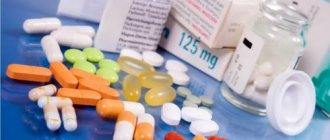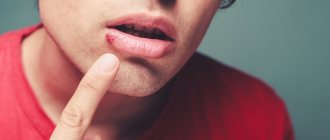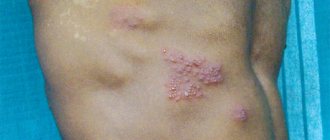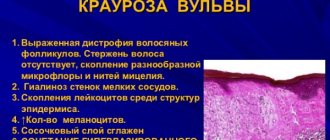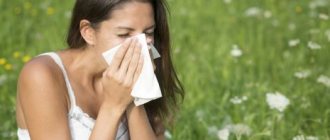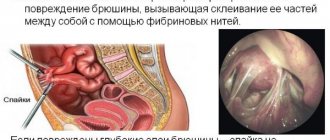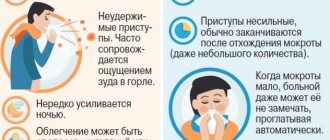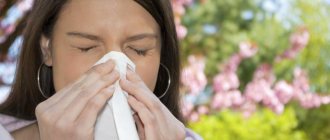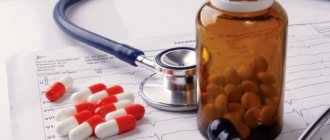The body reacts negatively to extraneous stimuli, promoting the activation of a defense mechanism. Tablets of the appropriate direction should be kept on hand for people who regularly suffer from allergies. It manifests itself as a rash and itching, sneezing, choking, runny nose, cough, fever, nausea and other unpleasant symptoms. To urgently improve your well-being, you should choose a drug that will always be in your medicine cabinet. We have divided the medications by generation to make it easier for you to decide among the variety of medications.
How do allergy pills work?
An allergy is a response of the immune system to contact with irritants. As a result of an allergenic reaction, histamine, a mediator of allergy, enters an active state. In fact, histamine is a biologically active substance that is found in most human tissues. Normally, it is inactive and completely harmless. When transformed into an active state, histamine begins to negatively affect the state of the respiratory, muscular and nervous systems, as well as other tissues.
Against the background of histamine activity, the following pathological reactions in the body can be observed: active secretion of gastric juice in the digestive tract, lacrimation and profuse mucous discharge from the nose, vasodilation with subsequent tissue swelling, muscle spasms that provoke respiratory disorders, heart pain, diarrhea, etc.
Anti-allergy tablets contain components that block histamine receptors, as a result of which the allergy mediator ceases to have its negative effect.
Antiallergic drugs are classified into three generations - first, second and third. There are also the latest generation of allergy medications. Let's look at all these groups in more detail.
Why does the reaction occur?
As medical statistics show, the number of reported cases of food allergies has been steadily increasing in recent years.
The reasons that cause its manifestation are:
- Hereditary and genetic predisposition. It has been proven that if one of your close relatives suffers from a food allergy, then this disease can be inherited.
- Wrong lifestyle. Bad habits significantly reduce the body's immune defense.
- Problems with the gastrointestinal system. The reason to consult a gastroenterologist is the unexpected appearance of an allergy.
- Lack of proper nutrition. The diet should be balanced, the consumption of seasonal products should not be excessive.
- Quality of modern food products. Almost every second food product purchased contains dyes, emulsifiers, preservatives, and various chemical additives. These substances are foreign to us, and the immune system perceives them as aggressors.
These reasons reduce the body’s ability to resist the penetration of foreign antibodies and increase the risk of developing the disease.
First generation
Until recently, allergy tablets of this generation were the only antihistamines. The disadvantage of these drugs is the fragile and reversible connection with histamine receptors, as a result of which the drug must be taken frequently and in excessive dosages, which is fraught with undesirable systemic effects.
First generation drugs have a specific effect on certain areas of the brain and can cause the following list of side effects:
- dry mouth;
- drowsiness, lethargy, impaired attention due to central nervous system depression;
- excitability, hyperactivity;
- rapid pulse, arrhythmia;
- constipation;
- blurred vision.
The therapeutic effect of drugs of this generation occurs fairly quickly, but it will not last long. In addition, there is a high probability of developing addiction to these medications, as a result of which they quickly lose their effectiveness, and the body requires the prescription of stronger drugs.
Currently, first-generation allergy pills are practically not prescribed by specialists, but we suggest considering this list:
| Product name | Action |
| Suprastin | The safest and most effective drug for allergies, which helps against itching, skin rashes, swelling, etc. The active ingredient of the drug enters the bloodstream in a minimal amount, so the risk of overdose and the development of side effects are negligible. Causes drowsiness. Prices for Suprastin vary between 180 rubles. |
| Diphenhydramine | It is effective against allergies, has an analgesic and antitussive effect, but has a lot of side effects. The cost is about 75 rubles. |
| Tavegil | An effective and inexpensive drug that causes few side effects. But allergic reactions may occur to its components. The price is about 160 rubles. |
| Diazolin | In many ways it is similar to Diphenhydramine, but does not provoke the development of drowsiness. Negatively affects the mucous membrane of the digestive tract. The price is about 70 rubles. |
| Fenkarol | The effectiveness of this drug is low. Price 380 rubles. |
General therapy
Excluding the causative type of allergen from food (elimination) is considered the main method of therapy.
If there is a reaction to rarely consumed foods, then elimination is the only method of therapy that gives a positive effect.
This method requires complete removal from the diet of a specific type of allergen and products that contain it, even in small quantities.
An elimination diet is characterized by replacing the causative allergen with a non-allergenic product.
It is recommended to increase the percentage of vegetable oils in food and significantly reduce the consumption of animal fats.
It is necessary to consume enterosorbents - substances found in the fibers of fruits and vegetables, bran and whole grain products.
All dishes must be steamed, stewed, boiled, baked, but not fried. Significantly reduce salt intake.
If a patient is prescribed a strict elimination diet, then it is necessary to ensure that the content of all its nutritional components strictly corresponds to his age and weight.
If you follow all the doctor’s instructions and follow this diet, your condition will improve within 4-6 days.
How to cure food allergies in adults depending on their manifestations
You can observe the manifestation of symptoms from the outside:
- skin: dryness, itching, redness, rashes;
- respiratory system: copious nasal discharge, cough, sneezing, difficulty breathing, shortness of breath, persistent nasal congestion;
- digestive system: vomiting, stool disturbances, nagging pain in the abdomen, tickling.
Skin rash
Medications and folk remedies are good in treating symptoms. For intravenous administration, “Calcium chloride” or “Sodium thiosulfate” is used. They help the body remove the allergen.
For an extensive rash, Prednisolone or Dexamethasone is added to these drugs.
At the same time, antihistamines of three generations are prescribed:
- “Suprastin”, “Diphenhydramine”, “Tavegil”, “Diazolin” - their duration of action is short and can cause drowsiness.
- “Fenistil”, “Cetirizine”, “Loratadine” - have a longer effect and cannot cause drowsiness.
- “Tigofast”, Erius”, “Telfast” - have a minimal number of side effects and a long period of action.
In case of chronic manifestation of the symptom, the hormonal drug Prednisolone tablets is prescribed. The course of taking it can be up to two months. Often taken in combination with antihistamines.
The manifestation of this symptom can be treated with the following groups of drugs:
- antihistamines of any generation (if there are existing liver problems, their use is possible only after consultation with a doctor).
- preparations and ointments based on corticosteroids (natural human hormones). They help relieve inflammation and have an analgesic effect. The course of taking them should not exceed 10 days (longer use is prescribed only by a doctor).
- non-hormonal ointments and creams. For healing, relieving dryness and inflammation of the skin, “Fenistil - gel”, Protopic”, “Panthenol”, “Bepanten” are used.
Gastrointestinal disorders
The manifestation of gastrointestinal symptoms is reduced by prescribing:
- strict diet;
- drugs that restore microflora (“Colibacterin”, “Bifidumbacterin”, “Lactobacterin”);
- agents that displace pathogenic microflora (if necessary): “Baktisubtil”, “Intetrix”.
If treatment of food allergies with drugs is started in a timely manner and carried out comprehensively, then its effectiveness increases several times.
Second generation
Second-generation antiallergic drugs contain components that are related to histamine receptors. What does this mean? These components cannot affect other types of receptors, except histamine, and areas of the brain. They create a long-lasting therapeutic effect - up to 12 hours, and do not provoke addiction.
But it is undesirable to prescribe second-generation tablets to children, elderly people and those who suffer from heart and vascular diseases, since these drugs negatively affect the functional activity of the heart muscle.
The table shows a list of second generation allergy pills:
| A drug | Peculiarities |
| Fenistil | It has much in common with previous generation antihistamines, but it “works” for a longer time and has much fewer unwanted effects. The cost is about 350 rubles. |
| Claritin | A common and no less effective antiallergic drug, the safest in this group. Does not have a sedative effect and does not react with other drugs. The cost is about 180 rubles. |
| Semprex | The product is quite effective, but it “works” for a very short time, requiring frequent use of the drug. The price is about 120 rubles. |
| Trexil | It is rightfully considered a pioneer in this group of antihistamines; it is effective against allergies, but negatively affects the functioning of the cardiac system. The price is about 100 rubles. |
What is an allergen
There are a lot of allergens that can cause allergies. Studies have shown that 90% of all cases of this disease are caused by the consumption of only eight products.
The following products are distinguished in descending order by allergic significance::
Often these products cause deaths during anaphylactic shock.
Third generation
Third generation drugs have been developed quite recently. They have their own specific differences from antiallergic drugs of previous generations. These allergy pills, which do not cause drowsiness and do not affect the cardiovascular system, have a faster and longer-lasting effect. They are allowed for children and the elderly, as well as for persons whose work activity involves serious mechanisms or requires high concentration.
Which allergy pills are included in this group?
| Drug name | Action |
| Telfast | An effective and safe drug among members of its group. Telfast does not affect psychomotor reactions, does not cause central nervous system depression, and does not interact with other drugs. But these allergy pills for children are not prescribed until they reach 6 years of age. The cost is approximately 570 rubles. |
| Cetirizine | Good tablets for skin allergies. The drug does not accumulate in tissues, quickly gets to the affected area and perfectly eliminates the signs of dermatitis and rashes on the skin. The drug can be prescribed to children from 2 years of age. The cost is about 120 rubles. |
| Fexofenadine | A similar drug to Telfast. It does not negatively affect the brain and nervous system, it is quite effective and safe. Price 280 rubles. |
| Tsetrin | The safest and most effective remedy for combating allergies. Prescribed for adults and children over 2 years of age. Does not cause side effects such as CNS depression. The cost is approximately 180 rubles. |
| Zyrtec | A drug that causes almost no unwanted effects and works for 24 hours. Not recommended for problems with the urinary system. The price is about 250 rubles. |
Causes and signs of skin allergies
An allergy is the body's reaction to exposure to a foreign substance (allergen). One of the most common manifestations of this response is urticaria. Modern experts have been able to prove that eczema, diffuse neurodermatitis, dermatitis and some other skin diseases can also have an allergic origin.
Among the main allergens that provoke skin rashes are:
- Food: eggs, chocolate, nuts, citrus fruits, strawberries, high-fat milk, seafood, honey.
- Medicines: antibiotics, analgesics, sulfonamides.
- Plant fingers: birch, quinoa, ragweed, alder and some others.
- Animal wool, fluff, feather.
- Sun, frost, strong wind.
- Chemical substances.
Recently, skin manifestations of allergies have become increasingly diagnosed. Experts attribute this to poor environmental conditions, poor diet and an abundance of stress. People at particular risk include hairdressers, people employed in industrial production, and healthcare workers.
Shortly after exposure to the allergen, negative signs of the disease begin to appear:
- The skin turns red and tissue swelling is noted.
- Severe itching begins.
- Rashes of various structures appear: blisters, small rashes, and so on.
- The skin peels off greatly and cracks form on its surface.
If you comb the epidermis at such a moment, the wounds become re-infected. This is fraught with the development of purulent processes. The sooner treatment is started, the greater the chance of preventing the development of complications.
Allergies are more often diagnosed in people with weakened immune systems. People who have suffered serious illnesses, take medications, or have bad habits need to be especially careful.
New generation allergy tablets
Allergy pills of the new generation, or, as it is more often called, the latest, “work” better than the above-mentioned medications and do not have a negative effect on the functionality of the cardiovascular system. Let's list them.
- Erius is a drug that blocks histamine receptors, resulting in inhibition of possible negative reactions in the body caused by the allergen. Erius tablets cost about 600 rubles.
- Xizal is a histamine receptor blocker that practically does not provoke the development of adverse reactions. Allowed for children from 2 years old. The price is about 500 rubles.
It is important to remember that these allergy pills, despite the fact that they are new on the pharmacy market, have their own list of contraindications. Their list is insignificant; as a rule, they are not recommended during pregnancy and have restrictions for use in childhood.
Regardless of which generation antihistamines belong to, you cannot choose them yourself to treat allergies. Treatment prescribed by a specialist will allow you to achieve a successful recovery in a short time and protect your wallet from purchasing inappropriate and unnecessary medications.
Differences in therapy for children and adults
Timely identification of the product that causes the body’s reaction and combating the signs of its manifestation is the main condition for effective treatment of the disease.
The best and simplest way, suitable for adults and children, is to exclude the problematic product or food where it is found from the diet. Everyone around (family, friends, colleagues) should know about its existence.
Treatment of an adult patient with an acute form of allergy must be carried out under the supervision of a specialist. The patient may be prescribed Epinephrine injections.
This drug stops the release of histamine and makes breathing easier. For further treatment, combined treatment with antihistamine drugs and Epinifrine is prescribed.
Treatment of food allergies in children includes internal therapy in combination with external therapy. Second generation antihistamine drugs are most often prescribed.
There are many drugs: some can be taken from the first days of life, others only after reaching a certain age.
All these medications reduce itching, swelling and hyperemia (redness) of the skin. For atopic dermatitis, the use of infusions, compresses, and herbal baths is prohibited.
A child, like an adult, with an acute form of the disease must constantly wear a bracelet indicating the type of allergen. This is necessary to quickly provide assistance and avoid anaphylactic shock.
Can you be allergic to beer? The answer is here.
Hormonal and homeopathic drugs
Hormonal allergy pills can be classified as the third generation of antihistamines. They contain chemical components that can have a systemic effect on the human body. Hormone-containing drugs are prescribed for allergic conditions in exceptional cases when the therapeutic effect of antihistamines is absent and allergic manifestations are severe.
Long-term use of hormonal drugs is contraindicated, as they quickly become addictive. Reviews of the use of these medications indicate that a common complication of their use is gastric ulcer. These drugs also affect the immune system, significantly reducing its defenses. Blood pressure often increases and disturbances in the functioning of the heart occur.
The treatment course with hormonal antiallergic drugs can last no more than 5 days. At an early age, treatment with hormone-containing drugs in the form of tablets is contraindicated. The list of these drugs includes: Kestin, Prednisolone, Hydrocortisone, Ultralan, etc.
Homeopathic medicines that do not have any contraindications for use or side effects are also suitable for treating allergies. They can be prescribed to children and expectant mothers from birth; breastfeeding is also not a contraindication in this case.
Homeopathic antiallergic therapy is not addictive, does not require an increase in the dose of the drug, and, most importantly, it encourages the body to independently produce antibodies to some specific irritants. But there is also a “fly in the ointment” - these drugs are synthesized from plant and animal components, which means that the drugs themselves can cause an allergic reaction.
Homeopathic treatment works according to a cumulative mechanism. Regular use of the drug to obtain the necessary therapeutic effect must be carried out for 8 months or more.
What homeopathic medicines for allergies are most often prescribed:
- Luffel is a natural remedy created on the basis of herbaceous vines. The drug is effective against allergic rhinitis. The drug is contraindicated for people suffering from endocrine system disorders.
- Rhinital is a drug aimed at combating hay fever, hay fever and year-round allergic rhinitis. The product eliminates tissue swelling, itching and irritation.
Allergy treatment
A sensitized organism perceives some substances received from the external environment as foreign. As a result of this reaction, specific antibodies are formed and an allergy develops. Failure to promptly relieve the symptoms of the disease can lead to serious consequences. For each patient, the disease proceeds purely individually - allergy medicine should be prescribed only after a detailed analysis of the problem. Depending on the nature of the symptoms, the following is prescribed:
- antihistamine tablets and ointments;
- hormonal agents;
- allergy medications by injection.
Allergy tablets for children
If a child suffers from allergies, it is necessary to approach the choice of medication as responsibly as possible. Allergic reactions in children can occur at any age, even at the neonatal stage. If allergies are not treated, the disease can be complicated by conditions such as bronchial asthma, autoimmune disorders and other pathologies, including disability.
Needless to say, self-medication in childhood is not the best solution. A specialist should prescribe and monitor the course of treatment.
We list in the table the drugs allowed in childhood, including from birth.
| Drug name | Release form | Features of application |
| Diphenhydramine | Tablets, injection solution, suppositories. | Diphenhydramine in the form of suppositories and injections is allowed from the second month of a child’s life. The drug is prescribed in tablet form strictly from 3 years of age. It is used for allergies on the face and skin, for cold allergies, etc. |
| Pipolfen | Tablets, dragees, injection solution. | Pipolfen tablets and injections can be used from the age of 2 months, tablets only from 6 years of age. Indications for use: skin allergies, allergic rhinitis, etc. |
| Fenistil | Drops for internal use, capsules, gel for external use. | Drops are prescribed from the first month of a newborn’s life. The gel can also be used from birth, but under the supervision of a doctor. Capsules can be taken from 12 years of age. Prescribed for food allergies, skin allergies and cold allergies, instilling the drug into the child 20 minutes before going outside. |
| Peritol | Pills. | The drug is approved from 2 years of age. Works against cold and against skin allergies, relieving symptoms of itching and swelling of tissues. |
| Diazolin | Pills. | Diazolin can be used from 1 year of age. Before use, it is recommended to crush the tablet to a powder state. Prescribed for allergic conjunctivitis - eye allergies, skin reactions, hay fever. |
It is important to consider that the main goal of allergy treatment is to identify and eliminate the allergen or specific irritant, and not to take antiallergic drugs.
In childhood, individual hypersensitivity of the body can occur to any medications, cosmetics, animal hair, etc. Children who have a hereditary predisposition to this condition are most susceptible to allergic diseases. It is not easy to differentiate an allergic disease from other pathologies, so the diagnosis must be made by a doctor.
What helps with allergic rashes
The main way to treat rashes on the body is with antihistamines, which block the development of a reaction to an irritant. Antihistamines are divided into topical and oral.
Remedies for skin allergies are available in the form of tablets, drops, creams, balms or ointments.
In the complex therapy of allergic rashes, other groups of drugs are also used:
- Corticosteroids (Nasonex, Aldecin) . Hormonal medications that are used for skin swelling or large rashes.
- Antiallergic (Ketotifen, Intal) . Blockers of histamine production (a substance that provokes the body’s reaction to an irritant). Used to prevent bronchospasm in allergic syndrome.
- Immunomodulators (Viferon, Immunofan) . The rash often develops against the background of weakened body defenses. Medicines are taken to strengthen the immune system and prevent chronic allergies.
- Enterosorbents (Activated or White carbon) . They remove the allergen from the body and reduce the intensity of rashes.
- Homeopathic (Rhinital) . Natural medicines with a cumulative effect, used for up to six months, are not addictive.
Allergy pills during pregnancy
Expectant mothers face allergies in the same way while carrying a child. Which allergy pills during pregnancy are allowed for pregnant women is a controversial question. In the modern pharmacy market there are practically no antihistamines that are completely safe for pregnant women and lactation.
But allergic disease is a condition that can cause autoimmune disorders, so it needs to be addressed. This is why expectant mothers need to take antihistamines.
The best allergy pills help to quickly cope with the body's hypersensitivity reaction with minimal risk to the developing fetus. Such drugs should not have a teratogenic effect, so they can be prescribed not only during pregnancy, but also in newborns and during breastfeeding.
So, the table shows the most effective antihistamines allowed during pregnancy, as well as those that are prohibited for use:
| Allowed tablets | Features of application |
| Cromoghlin | Can be used from the 2nd trimester under medical supervision. |
| Claritin | Can be taken from the 2nd trimester (analogue of Loratadine). |
| Suprastin | It can be prescribed in short-term courses or one-time from 13 to 36 weeks of gestation. |
| Cetirizine | The drug can be taken if necessary. |
| Prohibited pills | Cause of danger |
| Diphenhydramine | It is not effective enough, increases the excitability of the uterus, and threatens abortion. |
| Pipolfen | It can cause neurological and motor disorders in the fetus and in the newborn child, so it should not be prescribed to pregnant women or for allergies during breastfeeding. |
| Tavegil | Penetrates the placental barrier, contributing to the development of neurological and other pathologies of fetal development. |
How to treat skin allergies in adults?
It is easy to get confused in the modern variety of allergy medications. Therefore, you should not self-medicate. The choice of specific medications should be made by a doctor. In this case, it is necessary to take into account:
- The severity of the disease.
- Characteristics of skin rashes.
- Manifestation of accompanying symptoms.
- Presence of other diseases.
- Patient's age.
The medications need to be changed every few weeks. Over time, allergens lose sensitivity to the active substance and it must be replaced with another. The duration of therapy is also selected individually.
Among the most effective remedies against skin allergies is Diazolin. It is taken after meals. It helps to quickly relieve itching, swelling of tissues, and eliminate rashes. The medication is prohibited for use by people suffering from diseases of the gastrointestinal tract, during pregnancy, as well as in the presence of individual intolerance to the components.
Erius is considered one of the most modern drugs. It turns out to be effective against all types of allergies. During pregnancy and breastfeeding, taking medication is allowed only in exceptional cases.
Table of drugs and their cheap analogues
In the table below, we have compiled a list of antihistamines that are most often prescribed by a doctor, and we have selected more affordable analogues for them - drugs with the same active ingredient.
| Active substance | Expensive drugs | Cheap analogues |
| Cetirizine | Zyrtec - 225 rub. Cetrin - 350 rub. | Cetirizine Hexal - 60 rub. Cetirizine Teva - 110 rubles. |
| Fexofenadine | Allegra - 800 rub. | Fexadin - 350 rub. Gifast - 240 rub. |
| Loratadine | Claritin - 250 rub. | Loratadine - 40 rub. Clarotadine - 120 rub. Loragexal - 55 rub. Clarisens - 75 rub. |
| Desloratadine | Erius - 600 rub. | Desal - 150 rubles. Desloratadine Teva - 275 rubles. |
Use of drugs
Complexity and step-by-step therapy are the main principles of treating the disease, which are aimed at eliminating its symptoms and preventing exacerbations.
Drugs used in treatment:
- antihistamine group. Most antihistamines can be used prophylactically;
- glucocorticoids. They are intended to stabilize a serious condition. The course of taking them depends on the severity of the allergy and ranges from 3 to 14 days;
- Cromolyn. The drug is intended for oral administration before meals and is prescribed for a long time;
- adrenalin. Patients should always have this drug in their home pharmacy. In case of anaphylactic shock, adrenaline is the first emergency aid.
If attacks of the disease occur quite often and are severe, immunotherapy is prescribed. This method significantly reduces the manifestation of the disease, and in some cases eliminates it.
A prerequisite for quality treatment of the disease is the use of drugs prescribed by a doctor.
Selecting them independently and setting the dosage may not only be ineffective, but, on the contrary, worsen the condition.
KESTIN - cumulative action
Price - 200 rub.
Active ingredient: Ebastine.
A strong, long-lasting drug. Begins to fight symptoms within 45 minutes after administration. Has a cumulative effect. Helps with conjunctivitis and rhinitis, fights intolerance to pollen and flowering plants. Easy to use: just take 1 tablet per day. You need to drink plenty of water. Consumers appreciate this medication because it accumulates in the body and it is enough to take a shortened course.
Advantages:
- Does not cause dry mouth.
- Quickly relieves swelling and itching.
- Effective in the evening: normalizes sleep.
Side effects include lethargy and loss of strength. Due to the fact that it has a strong effect on the cardiovascular system, it is contraindicated for children under 12 years of age, pregnant women and the elderly.
How to choose the best product
To choose the best and inexpensive remedy for allergies, you need to carefully study the instructions for the drug and use it correctly. Most often, people buy products that are actively advertised on TV and on signs at pharmacy kiosks. To combat the symptoms of the disease and choose the most effective drug, you should pay attention to the following parameters:
- There should be a minimum of contraindications.
- Side effects most often appear if the dosage is exceeded. If a person does not feel a positive effect from the first use, there is no need to take several tablets in a row. It's better to change the medicine.
- The medication must fight the chronic form of the disease.
- Performance.
- Pay attention to the effect the drug has on the nervous and cardiovascular systems.
- It should be possible to use during pregnancy and breastfeeding.
- Compatibility with other substances.
- Gel forms are safer, but most often they only relieve symptoms and do not cure the disease.
- At what age it is possible to use the medicine is also one of the main indicators. It is worth choosing a universal medicine that will help all family members.
- Availability and pricing policy.
Experts do not recommend purchasing substances that impair performance. If the allergy manifests itself only on the skin, without a runny nose or sneezing, then you should use Fenistil gel. To provide first aid to the body, keep Erius in your first aid kit. This is the most budget-friendly and effective option.
Decongestants
A group of decongestants, or vasoconstrictors, are used for the symptomatic treatment of allergic rhinitis caused by food allergens. These pharmacological agents eliminate swelling and nasal congestion and facilitate nasal breathing.
The disadvantage of the drugs is the possibility of tachyphylaxis, as well as the likelihood of developing drug-induced rhinitis caused by constant use. To avoid side effects, it is recommended to continue administering nasal drops and sprays for no more than 4 (at most 5–7) days, strictly monitor and limit the frequency
application, monitor the dosage.
Decongestants should not be used to relieve symptoms in young children.
It is difficult for children to calculate the dose, and the drug administered intranasally acts not only topically. When absorbed from the stomach, it produces systemic effects that can be quite severe. Therefore, there are restrictions according to which it is advisable to start using it no earlier than the child reaches the age of 6 years.
Glucocorticosteroids
Glucocorticosteroids are hormones produced by the adrenal cortex. The most commonly used are hydrocortisone derivatives and semi-synthetic analogues (Prednisolone, Dexamethasone). They have a pronounced anti-inflammatory and anti-allergic effect and are intended for:
Glucocorticosteroids have a more powerful effect than antihistamines and cromones and are prescribed for severe allergies. Since food allergies can manifest themselves in different symptoms (respiratory, dermatological, etc.), topical forms are most often used - for example, ointments, creams, intranasal sprays, eye drops. In case of a systemic allergic reaction, it is advisable to use systemic forms.
Glucocorticosteroids have a number of side effects and contraindications and are not suitable for independent long-term treatment.
GISTALONG - effect after the first tablet
Price - 1,300 rubles.
Active ingredient: Astemizole.
To prevent allergic reactions, it is enough to take 1 capsule per month. There are no analogues in the world for long-term effects. Gistalong helps with chronic disease and if the disease is severe. In families with allergies, this substance should always be in the first aid kit. Removes swelling and itching within 15 minutes. Doctors prescribe this medication when the disease is acute.
Advantages:
- The effect lasts for a long time.
- Quick elimination of consequences.
- Convenience and efficiency.
The disadvantages include the very high cost. Sometimes there are problems with the heart valve. Frequent use is not recommended.
Prevention
In order to exclude the future manifestation of food-type allergies in children, and in adults to reduce the risk of its reappearance, it is necessary to take preventive measures.
Allergy prevention measures include:
- Proper and balanced nutrition for pregnant and lactating women.
- Timely diagnosis and treatment of diseases of the digestive system.
- Partial or complete (if possible) exclusion of allergenic foods from the diet.
- Avoid smoking society, as tobacco smoke only intensifies the reaction.
- Allergenic products must be heat or cold processed.
- Stick to a healthy diet.
Food allergies force you to think differently about your lifestyle.
To paraphrase the well-known expression “Your health is in your hands,” from the side of this disease we can say “Our health is in what we eat.”
To avoid the disease, you should eat right and, if necessary, follow all the doctor’s recommendations and prescriptions.
Using Herbs
Traditional medicine often helps in treating food allergies. But their use is dangerous without consulting a doctor.
There are often cases when, instead of the expected positive effect, an allergic reaction can only intensify and lead to a critical condition.
Many plants may contain substances that provoke short-term itching, rashes, difficulty breathing, etc. Therefore, herbal treatment should be treated responsibly and with caution.
To ease the symptoms of the disease and after consulting a doctor, you can use the advice of traditional medicine.
To prepare decoctions and infusions you can use:
- freshly squeezed celery root juice. It is recommended to drink 1 teaspoon up to three times a day;
- decoction of string: 1 tbsp. Steam a spoonful of the plant with a glass of boiling water and drink immediately after brewing.
- decoction of calendula flowers: 10 gr. the plants are brewed with 2 glasses of water, infused for 2 hours, filtered, taken according to Art. spoon 3 times a day.
- nettle flowers are poured with boiling water in a ratio of 1 tbsp. spoon of flowers per 1 glass of water. Leave for 30 minutes, strain. Take up to 5 times a day, 0.5 cups warm.
The traditional medicine methods used to treat food allergies have not proven their full effectiveness and have not been refuted. Therefore, their use is possible only as an addition to the main drug therapy.
What to do if the allergy does not go away?
You suffer from sneezing, coughing, itching, rashes and redness of the skin, and maybe your allergies are even more serious. And isolating the allergen is unpleasant or completely impossible.
In addition, allergies lead to diseases such as asthma, urticaria, and dermatitis. And for some reason the recommended medications are not effective in your case and do not combat the cause in any way...
We recommend reading in our blogs the story of Anna Kuznetsova, how she got rid of allergies when doctors gave her a hard time. Read the article >>
Author: Torsunova Tatyana
How to get rid of allergic rhinitis forever?
- Allergic rhinitis spray
- List of allergy eye drops
Finogenova Angelina: “In 2 weeks I completely cured my allergies and got a fluffy cat without expensive drugs and procedures. It was simple enough. ” More>>
Our readers recommend
For the prevention and treatment of allergic diseases, our readers recommend using the “ Allergonix ” product. Unlike other products, Allergonix shows lasting and stable results. Already on the 5th day of use, allergy symptoms decrease, and after 1 course it goes away completely. The product can be used both for prevention and to relieve acute manifestations.
Any use of site materials is permitted only with the consent of the portal editors and by installing an active link to the source.
The information published on the site is intended for informational purposes only and in no way calls for independent diagnosis and treatment. To make informed decisions about treatment and medications, consultation with a qualified physician is required. The information posted on the site is obtained from open sources. The portal's editors are not responsible for its accuracy.
Symptoms
Allergy to medications is a dangerous condition, so it is important to know how it manifests itself. The symptoms of the pathology are quite extensive and are divided into several types:
- Immediate reaction. Occurs immediately after the drug enters the body or within 1 hour. Such rapid symptoms appear due to class E immunoglobulins. It includes:
- anaphylactic shock (rapid deterioration in physical condition, characterized by a drop in blood pressure, sudden disturbances in the functioning of the cardiovascular, respiratory, and nervous systems, up to and including death in the absence of emergency assistance);
- acute urticaria (multiple clusters of blisters on different parts of the skin, accompanied by severe itching);
- Quincke's edema (occurs on the mucous membranes or subcutaneous tissue, dangerous when localized in the larynx or in the brain area);
- hemolytic anemia (destruction of red blood cells, manifested by tachycardia, weakness, dizziness, enlarged spleen and liver, chest pain, jaundiced skin);
- attack of bronchial asthma.
The development of such reactions is usually provoked by the administration of drugs from a number of penicillins, salicylates or serums.
- Immune complex reaction (subacute type). It appears within 24 hours after taking the medicine and is expressed in the form of pathological changes in the blood:
- thrombocytopenia (decreased platelet count, leading to an increased risk of bleeding);
- agranulocytosis (a decrease in the number of leukocytes, which leads to a decrease in the resistance of the immune system to bacterial or fungal pathogens).
In addition to the listed symptoms, fever often occurs, accompanied by joint pain and headache. However, elevated body temperature can be not only an allergic sign, but also a symptom of serum sickness. The body's immune complex response manifests itself as a reaction to antibiotics, anti-tuberculosis drugs, anesthetics, vaccines, and serums.
- Hypersensitivity of the cytotoxic type, i.e. The interaction of IgM or IgG antibodies with the irritant occurs at the cellular level. In this case, the following are observed:
- deviations in hematopoiesis (allergic cytopenias);
- allergic hepatitis;
- allergic nephritis.
The appearance of such symptoms is typical for allergies to hydralazine, phenytoin, procainamide.
- Prolonged type reaction (cell-mediated). Associated with the formation of cytokines with the participation of T-lymphocytes, causing allergic symptoms. It develops a few days after drug therapy and is expressed by the following symptoms:
- serum sickness;
- allergic vasculitis (pathology of blood vessels, expressed by the appearance of erythema or papular rash on the face, oral mucosa, genitals and other organs);
- polyarthritis;
- Stevens-Johnson syndrome (a complicated type of exudative erythema on the skin);
- Lyell's syndrome, in which necrosis of local areas of the skin occurs with the formation of eroded, painful lesions (pictured).
The pathology is accompanied by severe dehydration and infectious-toxic shock, which can lead to death.
Pseudoform
Sometimes, during drug therapy, a process occurs that is very similar in its manifestations to an allergy to pills, but has a different mechanism. This is a so-called pseudoallergic reaction associated with the formation of a large amount of histamine under the influence of medications. Distinctive features of the pseudoform are:
- typical symptoms are observed after the initial dose;
- there is no immune response to the administered antigen;
- Preliminary diagnosis does not provide information about existing allergies.
The clinical picture of pseudoallergy is brighter, the larger the dose of the medicine received and the faster it enters the blood. Such reactions can provoke existing pathologies of the liver, kidneys, chronic infections, and metabolic disorders.

